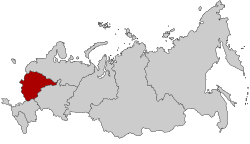Central Federal District
| Central Federal District Центральный федеральный округ | |
|---|---|
| Federal District of Russia | |
 | |
| Country |
|
| Established | May 18, 2000 |
| Administrative Center | Moscow |
| Government | |
| • Presidential Envoy | Alexander Beglov |
| Area[1] | |
| • Total | 650,200 km2 (251,000 sq mi) |
| Area rank | 6th |
| Population (2010 Census[2]) | |
| • Total | 38,427,539 |
| • Rank | 1st |
| • Density | 59/km2 (150/sq mi) |
| • Urban | 81.3% |
| • Rural | 18.7% |
| Federal subjects | 18 contained |
| Economic regions | 2 contained |
| Website |
cfo |
The Central Federal District (Russian: Центра́льный федера́льный о́круг, tr. Tsentralny federalny okrug; IPA: [tsɨnˈtralʲnɨj fʲɪdʲɪˈralʲnɨj ˈokrʊk]) is one of the eight federal districts of Russia. The word "Central" has a political and historical meaning, being the core of the Russian state and its predecessor, the Grand Duchy of Muscovy. Geographically, the district is situated in the extreme west of present-day Russia; although it can be considered as the central region of European Russia. The district covers an area of 650,200 square kilometers (251,000 sq mi),[1] and recorded a population of 38,427,537 (81.3% urban) in the 2010 Census.[2] The Presidential Envoy to the Central Federal District is Alexander Beglov.
Demographics
Federal subjects
The district comprises the Central and Central Black Earth economic regions and eighteen federal subjects:
.svg.png) | |||||
|---|---|---|---|---|---|
| # | Flag | Federal subject | Area in km2[1] | Population | Administrative center |
| 1 | |
Belgorod Oblast | 27,100 | 1,511,620 | Belgorod |
| 2 | |
Bryansk Oblast | 34,900 | 1,378,941 | Bryansk |
| 3 | |
Vladimir Oblast | 29,100 | 1,523,990 | Vladimir |
| 4 | |
Voronezh Oblast | 52,200 | 2,378,803 | Voronezh |
| 5 | |
Ivanovo Oblast | 21,400 | 1,148,329 | Ivanovo |
| 6 | |
Kaluga Oblast | 29,800 | 1,041,641 | Kaluga |
| 7 | |
Kostroma Oblast | 60,200 | 736,641 | Kostroma |
| 8 | |
Kursk Oblast | 30,000 | 1,235,091 | Kursk |
| 9 | |
Lipetsk Oblast | 24,000 | 1,213,499 | Lipetsk |
| 10 | |
Moscow | 2,600 | 10,382,754 | Moscow |
| 11 | |
Moscow Oblast | 44,300 | 6,618,538 | None; most public authorities located in Moscow, subject administration located in Krasnogorsk |
| 12 | |
Oryol Oblast | 24,700 | 860,262 | Oryol |
| 13 | |
Ryazan Oblast | 39,600 | 1,227,910 | Ryazan |
| 14 | |
Smolensk Oblast | 49,800 | 1,049,574 | Smolensk |
| 15 | |
Tambov Oblast | 34,500 | 1,178,443 | Tambov |
| 16 | |
Tver Oblast | 84,200 | 1,471,459 | Tver |
| 17 | |
Tula Oblast | 25,700 | 1,675,758 | Tula |
| 18 | |
Yaroslavl Oblast | 36,200 | 1,367,398 | Yaroslavl |
References
- 1 2 3 "1.1. ОСНОВНЫЕ СОЦИАЛЬНО-ЭКОНОМИЧЕСКИЕ ПОКАЗАТЕЛИ в 2014 г." [MAIN SOCIOECONOMIC INDICATORS 2014]. Regions of Russia. Socioeconomic indicators - 2015 (in Russian). Russian Federal State Statistics Service. Retrieved 26 July 2016.
- 1 2 Russian Federal State Statistics Service (2011). "Всероссийская перепись населения 2010 года. Том 1" [2010 All-Russian Population Census, vol. 1]. Всероссийская перепись населения 2010 года (2010 All-Russia Population Census) (in Russian). Federal State Statistics Service. Retrieved June 29, 2012.
External links
| Wikimedia Commons has media related to Central Federal District. |
- Official site: Federal Cadaster Center of Russia (in Russian)
- Baikaland at Tripod.com at the Wayback Machine (archived February 20, 2007)
Coordinates: 54°31′59″N 37°37′01″E / 54.533°N 37.617°E